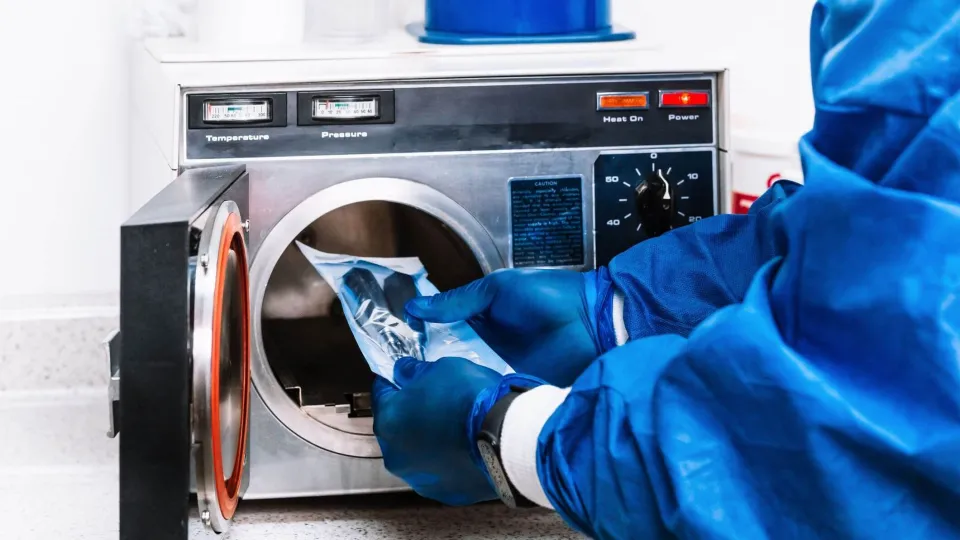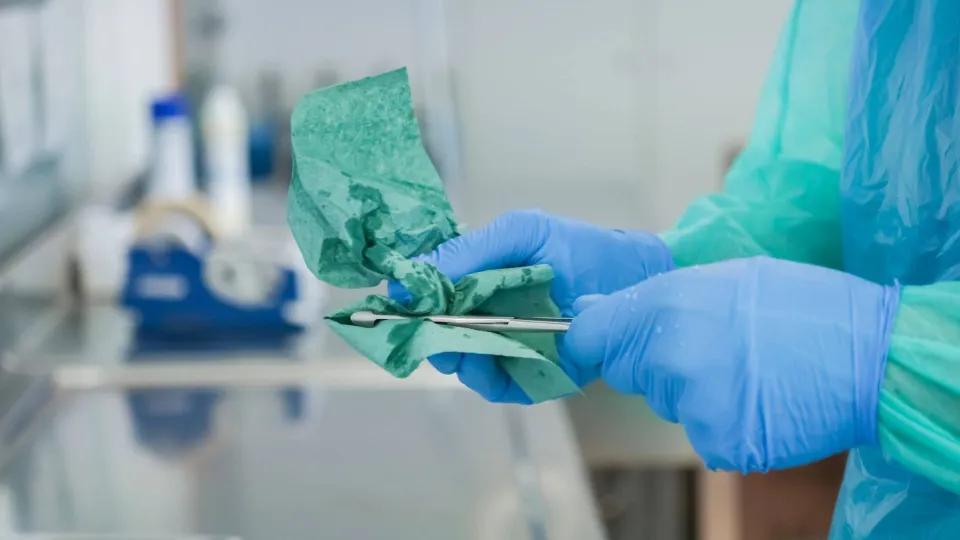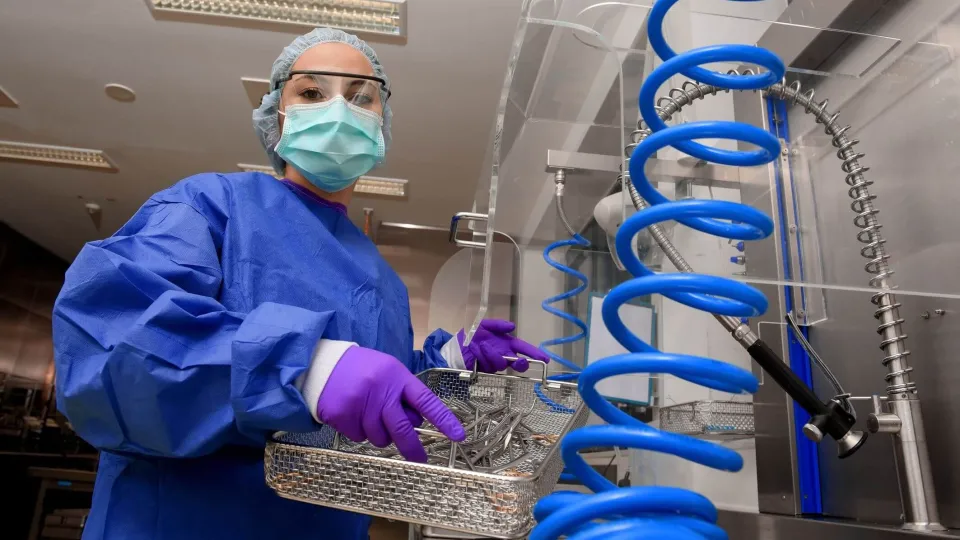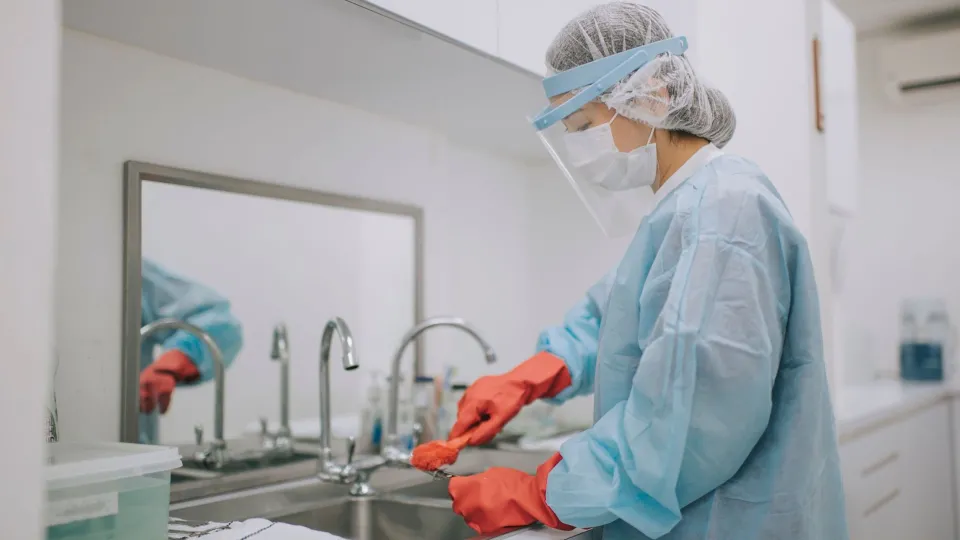
Sterile processing technicians prepare and organize surgical instruments and equipment in healthcare facilities. Sometimes called central sterile technicians, central processing technicians, or instrument technicians, they play a vital role in keeping patients safe and helping healthcare professionals work efficiently. They clean and sterilize instruments, catalog and monitor these tools, and ensure they're ready for surgical procedures. They work in various healthcare settings, including hospitals, the offices of dentists and doctors, and outpatient care centers. People interested in this important healthcare career participate in sterilization processing technician training to learn essential skills for this role.
Job Outlook
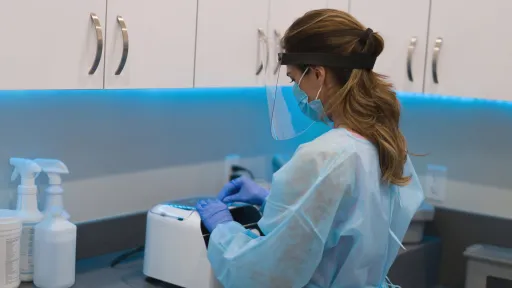
Sterile processing technicians are in demand as healthcare facilities struggle to fill vacancies. During the 2023 State of the Union for Sterile Processing and Technology podcast, a director of central sterile noted vacant roles that were filled in weeks before the COVID-19 pandemic now sit unfilled for months. His organization relied on traveling technicians but would prefer hiring permanent technicians invested in the local area. Another director's organization hired people with little to no experience and then invested in their training. This practice emphasizes the limited number of trained candidates available and the desirability of trained job applicants.
The U.S. Bureau of Labor Statistics includes sterile processing technicians in its statistics for medical equipment preparers. It noted:
- There were 70,700 medical equipment preparers employed in the United States in 2023.
- There will be an estimated 4,000 new job opportunities for these professionals between 2023 and 2033.
- That amounts to 6% annual job growth, which is faster than the average of 4%.
Related: How To Become a Sterile Processing Technician: Education Preparation
Training and Certification
Aspiring technicians undergo training at sterilization processing technician training schools to develop skills and become more marketable to employers. Certification can also help sterile processing technicians distinguish themselves from other candidates. It is a requirement for some states and employers.
Education Requirements
Aspiring sterile processing technicians have the opportunity to learn fundamental career skills and prepare for certification through sterile processing technician programs. Students require a high school diploma or equivalent, such as a GED. Some programs for sterile processing technician students may have additional requirements, such as requiring specific vaccinations or passing a drug or background screening. Periods of study vary depending on the school, the program, and its course load. For example, a student has the opportunity to earn a diploma from Concorde Career College's Sterile Processing Technician Diploma program in just five months. This program teaches students about:
- Medical terminology
- Infection control protocols
- Microbiology
- Anatomy
- Physiology
- Decontamination procedures
- Sterilization techniques for surgical and medical instruments
- Sterile storage
- Handling and disposal of medical instruments
- Quality assurance and documentation
- Inventory management
- Legal and ethical responsibilities of healthcare workers
Students can also apply their knowledge during a hands-on externship in a sterile processing facility. Aspiring sterile processing technicians may choose to attend classes at an educational facility or receive their sterile processing technician training online. Some schools offer hybrid courses that combine traditional and online study. Note that externships always involve face-to-face instruction, as supervisors need to demonstrate, assess competency, and offer feedback in real time.
Certification Options
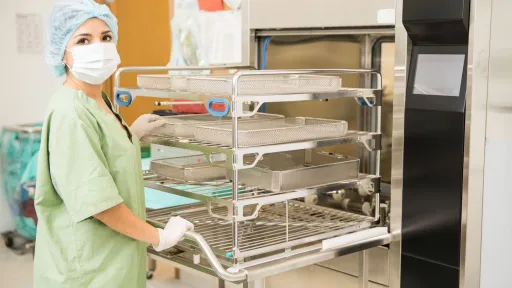
At the time of writing, people in Connecticut, Delaware, New Jersey, Pennsylvania, New York, and Tennessee need to become certified to work as sterile processing technicians. While certification is optional in other states, some healthcare organizations may require or prefer certified applicants. Even when it's not compulsory, getting certified may expand a sterile processing technician's career options and increase their chances of securing work. After graduating from an accredited sterile processing technician program, people can apply for one of the following certifications.
Certified Registered Central Service Technician
The Healthcare Sterile Processing Association issues CRCST certification. To secure this certification, applicants must pass an examination and complete 400 hours of hands-on experience, documented by an immediate manager or supervisor. They can complete this experience within six months of passing the exam for provisional certification or during the five years before their application for full certification. The three-hour exam features 150 multiple-choice questions that test applicants' understanding of:
- Departmental considerations
- Cleaning, decontamination, and disinfection processes
- Instrument preparation and packaging
- Sterilization processes
- Sterile storage, transport, and inventory management
- Patient care equipment and distribution
- Professional development and human relations skills
Certified Sterile Processing and Distribution Technician
The Certification Board for Sterile Processing and Distribution issues CSPDT certification. People can apply for this certification after achieving one of the following:
- Completing 12 months of full-time (or equivalent part-time hours) employment in a sterile processing and distribution role, verified by a manager
- Passing a sterile processing technician program with a grade of 70 or higher
- Completing six months of full-time employment (or equivalent part-time hours) in a related allied health role and the same period of sterile processing and distribution activities, verified by a manager
- Completing 12 months in a healthcare product sales or service role related to sterile processing and distribution
They must pass a three-hour exam, featuring 150 questions, with a grade of at least 70, to secure certification.
Skills and Responsibilities
Sterile processing technicians rely on key skills and understanding of emerging technologies to handle their daily responsibilities. Some of these responsibilities include:
- Cleaning and sterilizing instruments
- Operating and maintaining autoclaves, sometimes called steam sterilizers
- Packaging and preparing medical equipment for use
- Transporting prepared medical equipment to procedure rooms
- Ensuring procedure rooms in healthcare facilities are sterile
- Inspecting medical equipment to ensure it's sterile and functional
- Maintaining inventory of medical equipment
- Recording sterilization test results
- Operating medical equipment, as required
Some of the emerging technologies that sterile processing technicians are expected to understand and follow developments in include:
- Low-temperature sterilization methods, including vaporized hydrogen peroxide and ozone sterilization
- Robotic-assisted decontamination and sterilization systems
- Advanced inventory management systems, including automated systems
- Single-use sterilization technologies, including disposable instruments and single-use sterile barrier systems
Skills of successful sterile processing technicians include:
- Attention to detail to ensure all medical instruments, equipment, and settings are sterile and safe
- Organization to manage different department tasks
- Communication to understand the instrument and equipment needs of healthcare teams
- Teamwork to effectively collaborate with healthcare professionals
- Flexibility to adjust to the changing needs and schedules of healthcare facilities
- Problem-solving to manage unexpected issues, such as equipment failure and urgent case needs
Related: The Role of Sterile Processing in Health Care Facilities
How To Choose a Training Program
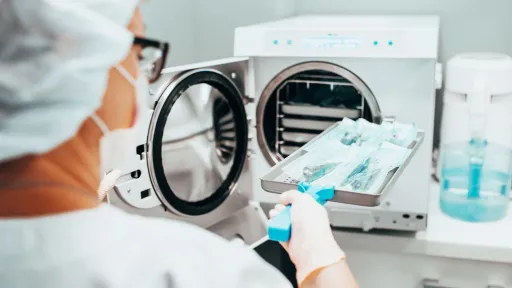
Aspiring sterile processing technicians should consider a variety of factors to find the right training program to meet their needs. People wanting to gain certification should study a program offered by an accredited educational facility to feel confident the curriculum meets the industry's standards. For example, Concorde is institutionally accredited by either the Accrediting Commission of Career Schools and Colleges (ACCSC) or the Council on Occupational Education (COE), depending on the location. They may also like to assess the curricula to confirm the topics interest them and are relevant to their professional goals.
People considering their study options may also assess which courses will best prepare them for their future. If they want the opportunity to become certified, they may look for a course that includes sterile processing tech certification online or traditional classroom preparation, either as part of the standard course or as an optional add-on. Programs with hands-on training components can help students apply their coursework to real-life situations and make transitioning into the workforce easier. Some programs also help students find job placements that may become full-time career opportunities. Our career services team assists graduates in their job search process.
Related: Why Consider a Vocational Career College
Career Advancement Opportunities
Motivated sterile processing technicians may seek opportunities for advancement. For example, experienced sterilization processing technicians can pursue additional education and training to learn management skills and advance to supervisory roles. Sterile processing technicians with special interests may specialize in a particular healthcare field with sterilization needs. For example, some sterile processing technicians may work exclusively in endoscopy or orthopedics.
Getting further certifications may help sterile processing technicians advance in their careers. For example, the HSPA offers a Certified Endoscope Reprocessor certification, which may appeal to someone who wants to specialize in endoscopy, and a Certified Health Leader certification, which may help a sterile processing technician secure a management position.
Some sterile processing technicians also decide to return to school and pursue further qualifications to move forward in their careers. For example, a sterile processing technician interested in spending more time in procedure rooms might pursue a Surgical Technology Associate Degree so they can assist surgeons and nurses more closely as a surgical technologist.
Conclusion
Becoming a sterile processing technician is a rewarding healthcare career that's vital for keeping patients safe. Studying a certified sterile processing technician training program is one of the first steps to securing one of these important healthcare roles.
If you're considering taking the first step toward this rewarding healthcare career, check out the Sterile Processing Technician Diploma program at select Concorde campuses. With a curriculum that combinesonline or classroom based learning (depending on the campus location), Concorde's training program gives you the opportunity to prepare for well-recognized certifications and train to become a sterile processing technician in just five months. Interested applicants should consult with an admissions representative for detailed information about admissions requirements. Start studying smarter and take the first steps toward your healthcare career today.
"Sterile Processing Technician Career Guide," Trusted, https://www.trustedhealth.com/allied-career-guide/sterile-processing-technician
"How Challenges in Sterile Processing Departments are Shaping the Future," Censis, https://censis.com/blog/how-challenges-in-sterile-processing-departments-are-shaping-the-future
"Data for Occupations Not Covered in Detail," U.S. Bureau of Labor Statistics, https://www.bls.gov/ooh/about/data-for-occupations-not-covered-in-detail.htm
"Sterile Processing Technician: Steps to Certification Success," MedAssisting, https://medassisting.org/sterile-processing-technician/
"Become a Sterile Processing Technician: Training & Certification Guide," HealthJob, https://www.healthjob.org/guide/how-to-become-a-sterile-processing-technician
"Sterile Processing Technician Program," Concorde, https://www.concorde.edu/allied-health-programs/sterile-processing
"Online Sterile Processing Technician Training Programs," Explore Medical Careers, https://www.exploremedicalcareers.com/sterile-processing-technician/online-programs/
"Certification Overview," Healthcare Sterile Processing Association, https://myhspa.org/certification/certification-overview/
"Certified Registered Central Service Technician (CRCST)," Healthcare Sterile Processing Association, https://myhspa.org/certification/certification-overview/certified-registered-central-service-technician-crcst/
"About CBSPD," Certification Board for Sterile Processing and Distribution, https://www.cbspd.net/about-cbspd/
"SPD Technician Certification Exam C.S.P.D.T," Certification Board for Sterile Processing and Distribution, https://www.cbspd.net/tech/
"Sterile Processing Technician," Concorde, https://dallas-catalogs.concorde.edu/sterile-processing-technician-dallas
"Everything About Autoclaves," Steris Healthcare, https://www.steris.com/healthcare/knowledge-center/sterile-processing/everything-about-autoclaves
"Emerging Technologies in Sterile Processing: Revolutionizing Healthcare Sterilization," Incision, https://www.incision.care/blog/emerging-technologies-in-sterile-processing
"We Are Concorde," Concorde, https://www.concorde.edu/about-us
"Tips on Choosing a Course," Good Universities Guide, https://www.gooduniversitiesguide.com.au/study-information/study-options/choosing-a-course
"Surgical Technology Associate Degree Program," Concorde, https://www.concorde.edu/patient-care-programs/surgical-technology
Take The Next Step Towards a Brighter Future
Interested in learning more about our Sterile Processing program?
We have a Concorde representative ready to talk about what matters most to you. Get answers about start dates, curriculum, financial aid, scholarships and more!

